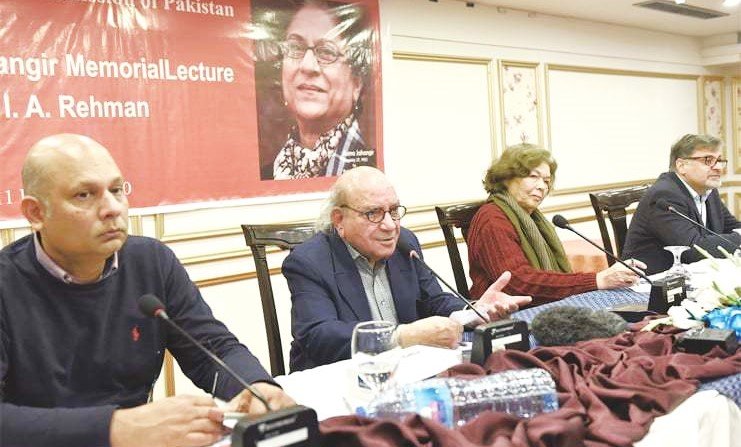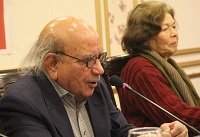 The audience at the first Asma Jehangir memorial lecture organised by the HRCP at Islamabad Hotel on Tuesday. Credit: Asif Khan/hrcp
The audience at the first Asma Jehangir memorial lecture organised by the HRCP at Islamabad Hotel on Tuesday. Credit: Asif Khan/hrcp
HRCP announces Asma Jahangir Award for human rights defenders; resumes Nisar Osmani Award for courage in journalism, and I.A Rehman research grant in human rights
By Amir Khan
Islamabad: A veteran human rights defender has called for a joint struggle for securing people’s economic rights, social justice and freedom of expression now under threat from the powerful and the state organs.
The constitution guarantees protection of people’s social and economic wellbeing, it is critical to secure the substance of these rights, their availability to all and their incremental expansion, HRCP honorary spokesperson I.A Rehman said while delivering the first Asma Jahangir memorial lecture at a local hotel on Tuesday.
“It fell to all of us to band together and demand that these rights and all other fundamental rights be protected and promoted,” he said.
Mr Rehman recounted his four-decade association with Ms Jahangir and highlighted her “transformation from a junior lawyer and a small-time agitator for justice for the underprivileged to become the foremost defender of people’s rights”.
She was a voice of sanity and compassion, a voice of the voiceless and the marginalized, a voice that instilled hope in the hearts of the hopeless, and a voice the people of this country relied upon two years ago and which they now need more than ever, he said.
Mr Rehman spoke about people’s fundamental right to ‘economic justice’ ranging from bonded labour and small farmers to lady health workers and journalists.
For him, the people’s economic rights – the ‘right to employment, and just and equitable conditions of work’ – should not be subject to the ‘availability of resources’.
“Our basic rights are the right to live a decent life, right to employment, paid holidays and form trade unions. It is the right of everyone to live free from hunger and improve their living conditions. It is said that a hungry man moves away from God and patriotism cannot be ensured on an empty stomach. Wars cannot be won even by the strongest armies without the backing of citizens whose loyalty can be secured only through good governance and respect for citizens’ rights.”
He quoted Prime Minister Imran Khan as saying that nothing was more important than providing succor to the poor. “Economic justice must not, therefore, be sacrificed at the altar of national security.”

Media crisis
Narrating the woes of the mediapersons Mr Rehman said: “The media is fighting for survival. About 7,000 journalists are reported to have lost their jobs, many have been subjected to heavy wage cuts, and there is no count of journalists who have not been paid for three to 10 months.”
He held the government responsible for the crisis that is choking the media. It is not even included in the industries that the government has chosen to pamper. The jobless are not getting jobs and those who have jobs are not getting salaries.
Farmers’ woes
Pakistan’s economy, according to the veteran journalist, is based on agriculture and a vast majority of the population is directly involved in the farming sector. However, the lack of growth has made small growers and tenants impoverished. While all kinds of privileges have been granted to big landlords, including facilities for making money by exporting wheat and sugar, nobody is talking of land reform without which neither land hunger can be eliminated nor an equitable land use pattern developed, to say nothing of social justice for the rural population.
Unemployment
Unemployment is on the rise, he noted, quoting Dr Hafeez Pasha, a former finance minister, and economist, who considers inequality the country’s biggest challenge. Several million people have lost jobs over two years and 1.2 million are likely to be rendered jobless this year, said Mr Rehman.
Despite the judiciary’s efforts to expedite the delivery of justice and put an order in the working of the administration, the common citizen cannot easily access justice. One does not know how to plead before the apex court for looking at the human cost of the demolition operations ordered by it, he added.
Many people have done no wrong and have been victims of fraudulent transactions by the builders’ mafia and the administrators’ bribe-induced slumber.
About missing persons, Mr Rehman said, “People are rotting in internment centres, the indescribable suffering of the families of victims of enforced disappearances, the plight of the displaced people in the tribal belt and the harassment of those who speak out for them, and the grief of the families of soldiers and policemen and polio workers who are killed by extremists.”

State policy vs Constitution
He questioned the state’s responsibilities and the Principles of Policy of the constitution.
“It is the funniest part of the Constitution which makes it mandatory for the state to discourage racial, tribal and sectarian prejudices; take steps to ensure women’s full participation in all spheres of national life; safeguard the legitimate rights of minorities; provide free and compulsory education, make technical and professional education available and higher education equally accessible to all based on merit; ensure inexpensive and expeditious justice.
“It also makes it mandatory for the state to make provision for securing just and humane conditions of work; secure the well-being of the people, irrespective of sex, caste, creed or race, by raising their standard of living, by preventing the concentration of wealth and the means of production and distribution in the hands of a few and by ensuring equitable adjustment of rights between employers and employees and landlords and tenants; provide for all citizens within the available resources of the country, facilities for work and adequate livelihood with reasonable rest and leisure.”
The Policy also makes it mandatory “to provide for all persons employed in the service of Pakistan or otherwise, social security by compulsory social insurance or other means; provide basic necessities of life such as food, clothing and housing, education, and medical relief for all such citizens, irrespective of sex, caste, creed or race, as are permanently or temporarily unable to earn their livelihood on account of infirmity, sickness or unemployment.
Sadly, Mr Rehman said, the language of the state’s responsibilities betrays the reservations the authors of the constitution had regarding rights.
Economic rights
“The main question, however, is that the economic rights of the people cannot forever be made subject to availability of resources. It seems the State of Pakistan has joined some other developing states to exploit a concession based on a lack of resources as a licence to deny the citizens their economic rights.
“If the state accepts its duty to raise resources for a variety of purposes it has a greater obligation to find resources for honouring its obligations to the citizens. After all, children’s education was recognized as a right in 2010. Shall we have to wait for another 37 years for the transfer of one or more rights from the Principles of Policy to the Fundamental Rights chapter?”
He reminded the state of its obligations after the ratification of the International Covenant on Economic, Social and Cultural Rights under which Pakistan has undertaken “to ensure the equal rights of men and women to the enjoyment of all economic, social and cultural rights outlined in the present Covenant”.
Mr Rehman also mentioned the fundamental rights enshrined in ILO conventions including the right of everyone to the enjoyment of the highest attainable standard of physical and mental health, the right to education, to take part in cultural life, to enjoy the benefits of scientific progress, to respect for freedom for scientific research and creative activity which are mentioned in the laws and policies already in force.

Charity or parasitism
He also questioned the various ‘relief packages’ announced by the government for the poor.
“There is much talk of offering the poor small amounts of money or rations free of cost or shelter for the homeless. These initiatives fall in the category of charitable gestures that can supplement poorer people’s incomes, they are no substitutes for the opportunities to earn livelihoods by doing some work. It is necessary to ensure that addiction to dole does not promote parasitism.”
He was of the view that dole policies did not reduce the number of hands that should be available for productive work.
He said many schools destroyed in Khyber-Pakhtunkhwa by extremists are still to be rebuilt and full implementation of Article 25-A depends on building a large number of new schools.
He suggested that a large number of unemployed and partly employed people can be put to work in the rebuilding of infrastructure in rural areas.
“The state cannot and it must not be allowed to look away from the plight of the hordes of peasants, industrial workers, labour(er) in the informal sector, bonded workers in agriculture or at brick kilns, jobless or underpaid journalists, underpaid lady health workers, the home-based women workers who are driving themselves to death for a pittance, the victims of land grabbers or manipulators in the housing sector, and young girls and boys and children who aspire to nothing more than equality of opportunity.
He called on audience that “it is time each and every conscious citizen of Pakistan tried to do whatever she or he can to secure the disadvantaged majority’s freedom from fear, hunger, want and disease, not so much as a favour to them as for our own redemption as good human beings and responsible citizens.”
The lecture was followed by a question-answer session.
Responding to a question, Mr Rehman said: “Pakistan has become a security state. We need to understand that only people can ensure security and no institution can guaranty security.”
Responding to a question by journalist Beena Sarwar, he said that student unions should be revived without imposing conditions. “Unfortunately, there is a dictatorial mindset and we need to resist it.”
Rights activist Tahira Abdullah said: “Today we are not allowed to go to Balochistan and speak about the issues of the former tribal agencies. Those who speak about the province are facing charges of sedition.” She cited the recent incident of the arrests of PTM head Manzoor Pashteen and activists of the Awami Workers Party.
Earlier in his welcome address HRCP Secretary-General Harris Khalique announced that the Commission was instituting the Asma Jahangir Award for Human Rights Defenders, and resuming the Nisar Osmani Award for Courage in Journalism and the I. A. Rehman Research Grant in Human Rights.
Responding to another question about rights violations in Gilgit-Baltistan and AJK, Mr Khalique said the third fact-finding report on GB will be launched soon and a chapter on AJK has been dedicated to the human rights situation in AJK in the forthcoming State of Human Rights Report to be launched in April.

The High Asia Herald is a member of High Asia Media Group — a window to High Asia and Central Asia

